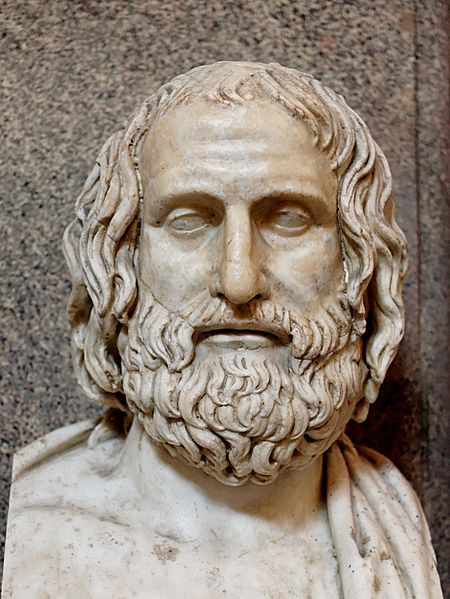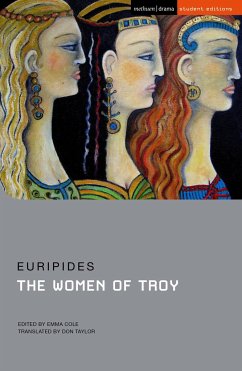Euripides
The Women of Troy
Herausgeber: Stevens, Jenny; Freeman, Sara; Nichols, Matthew; Megson, Chris / Übersetzer: Taylor, Don
15,99 €
inkl. MwSt.
Versandfertig in über 4 Wochen

8 °P sammeln
Euripides
The Women of Troy
Herausgeber: Stevens, Jenny; Freeman, Sara; Nichols, Matthew; Megson, Chris / Übersetzer: Taylor, Don
- Broschiertes Buch
- Merkliste
- Auf die Merkliste
- Bewerten Bewerten
- Teilen
- Produkt teilen
- Produkterinnerung
- Produkterinnerung
This new Student Edition offers a much-needed pedagogical framework to the play, including an overview of the original performance context; the times within which Euripides was writing it; and how it's been understood and adapted since.
Andere Kunden interessierten sich auch für
![Oedipus the King Oedipus the King]() SophoclesOedipus the King13,99 €
SophoclesOedipus the King13,99 €![Norma Jeane Baker of Troy Norma Jeane Baker of Troy]() Anne CarsonNorma Jeane Baker of Troy17,99 €
Anne CarsonNorma Jeane Baker of Troy17,99 €![Medea Medea]() EuripidesMedea15,99 €
EuripidesMedea15,99 €![Woyzeck Woyzeck]() Georg BuchnerWoyzeck15,99 €
Georg BuchnerWoyzeck15,99 €![Sing Yer Heart Out for the Lads Sing Yer Heart Out for the Lads]() Mr Roy WilliamsSing Yer Heart Out for the Lads18,99 €
Mr Roy WilliamsSing Yer Heart Out for the Lads18,99 €![The Cherry Orchard The Cherry Orchard]() Anton ChekhovThe Cherry Orchard12,99 €
Anton ChekhovThe Cherry Orchard12,99 €![The Memory of Water The Memory of Water]() Shelagh StephensonThe Memory of Water20,99 €
Shelagh StephensonThe Memory of Water20,99 €-
-
-
This new Student Edition offers a much-needed pedagogical framework to the play, including an overview of the original performance context; the times within which Euripides was writing it; and how it's been understood and adapted since.
Produktdetails
- Produktdetails
- Student Editions
- Verlag: Bloomsbury Publishing PLC
- Seitenzahl: 96
- Erscheinungstermin: 27. Juni 2024
- Englisch
- Abmessung: 188mm x 119mm x 8mm
- Gewicht: 88g
- ISBN-13: 9781350358324
- ISBN-10: 1350358320
- Artikelnr.: 69929267
- Herstellerkennzeichnung
- Libri GmbH
- Europaallee 1
- 36244 Bad Hersfeld
- gpsr@libri.de
- Student Editions
- Verlag: Bloomsbury Publishing PLC
- Seitenzahl: 96
- Erscheinungstermin: 27. Juni 2024
- Englisch
- Abmessung: 188mm x 119mm x 8mm
- Gewicht: 88g
- ISBN-13: 9781350358324
- ISBN-10: 1350358320
- Artikelnr.: 69929267
- Herstellerkennzeichnung
- Libri GmbH
- Europaallee 1
- 36244 Bad Hersfeld
- gpsr@libri.de
Euripides was born near Athens between 485 and 480 BC. His first play was presented in 455 BC and he wrote some hundred altogether of which nineteen survive - a greater number than those of Aeschylus and Sophocles combined - and which include Alkestis, Medea, Bacchae, Hippolytos, Ion and Iphigenia at Aulis. He died in 406 BC. Don Taylor (1936-2003) was a playwright and poet, and a director of theatre, television and radio plays. He worked as drama director at the BBC, and between 1960 and 1990, he directed nearly a hundred television plays. He translated and directed for BBC Television the Theban plays of Sophocles - Oedipus the King, Antigone and Oedipus at Colonus. He followed this with translations of three Euripides war plays - Iphigenia at Aulis, The Women of Troy and Helen. He was co-director of Compass Theatre for while and set up First Writes Radio with Ellen Dryden. Don Taylor's many stage plays include The Roses of Eyam, The Exorcism, Daughters of Venice, Brotherhood, When the Actors Come, Retreat from Moscow, When the Barbarians Came and his last play The Road to the Sea. Emma Cole is Senior Lecturer at the University of Queensland, Australia. She is a classicist and a theatre and performance studies scholar. Her area of expertise lies in the performance of Greek tragedy in contemporary theatre and she has published extensively on this topic, as well as having worked in collaboration with various theatre companies and practitioners on related creative outputs.

Chronology
Commentary
1. Synopsis of the Trojan War:
a) timeline and key people
b) representation in ancient Greek literature
c) myth versus history debate
2. Introduction to Euripides, the play and the City Dionysia theatre
festival where Euripides' plays were first performed:
a) his relation to Aeschylus and Sophocles
b) his status and success in antiquity
c) trademark dramaturgical qualities of Euripides' plays
d) transmission history of Euripides' plays
3. Original performance context including:
a) the institution of the City Dionysia and the physical space of the
Theatre of Dionysus
b) performance conventions of Greek tragedy, including the mask and chorus
c) the individuals involved in producing and staging Greek drama in the
C5th
4. Socio-political context including:
a) an introduction to the Peloponnesian War
b) an overview of the Sack of Melos in 416 BCE
c) an overview of debates regarding whether Euripides may have had time to
be influenced by the Sack of Melos, and how this backdrop may have informed
the audience's reading of the play
5. Modern reception history of the play including:
a) trends in the written translation and adaptation
b) modern performance history, including 6 key productions across a range
of geographical locations and on a variety of scales. Focuses on
contribution of directors, designers and performers
c) Don Taylor's translation in performance (Katie Mitchell's production at
the Royal National Theatre, 2007)
PLAY TEXT
Further reading
Notes
Commentary
1. Synopsis of the Trojan War:
a) timeline and key people
b) representation in ancient Greek literature
c) myth versus history debate
2. Introduction to Euripides, the play and the City Dionysia theatre
festival where Euripides' plays were first performed:
a) his relation to Aeschylus and Sophocles
b) his status and success in antiquity
c) trademark dramaturgical qualities of Euripides' plays
d) transmission history of Euripides' plays
3. Original performance context including:
a) the institution of the City Dionysia and the physical space of the
Theatre of Dionysus
b) performance conventions of Greek tragedy, including the mask and chorus
c) the individuals involved in producing and staging Greek drama in the
C5th
4. Socio-political context including:
a) an introduction to the Peloponnesian War
b) an overview of the Sack of Melos in 416 BCE
c) an overview of debates regarding whether Euripides may have had time to
be influenced by the Sack of Melos, and how this backdrop may have informed
the audience's reading of the play
5. Modern reception history of the play including:
a) trends in the written translation and adaptation
b) modern performance history, including 6 key productions across a range
of geographical locations and on a variety of scales. Focuses on
contribution of directors, designers and performers
c) Don Taylor's translation in performance (Katie Mitchell's production at
the Royal National Theatre, 2007)
PLAY TEXT
Further reading
Notes
Chronology
Commentary
1. Synopsis of the Trojan War:
a) timeline and key people
b) representation in ancient Greek literature
c) myth versus history debate
2. Introduction to Euripides, the play and the City Dionysia theatre
festival where Euripides' plays were first performed:
a) his relation to Aeschylus and Sophocles
b) his status and success in antiquity
c) trademark dramaturgical qualities of Euripides' plays
d) transmission history of Euripides' plays
3. Original performance context including:
a) the institution of the City Dionysia and the physical space of the
Theatre of Dionysus
b) performance conventions of Greek tragedy, including the mask and chorus
c) the individuals involved in producing and staging Greek drama in the
C5th
4. Socio-political context including:
a) an introduction to the Peloponnesian War
b) an overview of the Sack of Melos in 416 BCE
c) an overview of debates regarding whether Euripides may have had time to
be influenced by the Sack of Melos, and how this backdrop may have informed
the audience's reading of the play
5. Modern reception history of the play including:
a) trends in the written translation and adaptation
b) modern performance history, including 6 key productions across a range
of geographical locations and on a variety of scales. Focuses on
contribution of directors, designers and performers
c) Don Taylor's translation in performance (Katie Mitchell's production at
the Royal National Theatre, 2007)
PLAY TEXT
Further reading
Notes
Commentary
1. Synopsis of the Trojan War:
a) timeline and key people
b) representation in ancient Greek literature
c) myth versus history debate
2. Introduction to Euripides, the play and the City Dionysia theatre
festival where Euripides' plays were first performed:
a) his relation to Aeschylus and Sophocles
b) his status and success in antiquity
c) trademark dramaturgical qualities of Euripides' plays
d) transmission history of Euripides' plays
3. Original performance context including:
a) the institution of the City Dionysia and the physical space of the
Theatre of Dionysus
b) performance conventions of Greek tragedy, including the mask and chorus
c) the individuals involved in producing and staging Greek drama in the
C5th
4. Socio-political context including:
a) an introduction to the Peloponnesian War
b) an overview of the Sack of Melos in 416 BCE
c) an overview of debates regarding whether Euripides may have had time to
be influenced by the Sack of Melos, and how this backdrop may have informed
the audience's reading of the play
5. Modern reception history of the play including:
a) trends in the written translation and adaptation
b) modern performance history, including 6 key productions across a range
of geographical locations and on a variety of scales. Focuses on
contribution of directors, designers and performers
c) Don Taylor's translation in performance (Katie Mitchell's production at
the Royal National Theatre, 2007)
PLAY TEXT
Further reading
Notes







